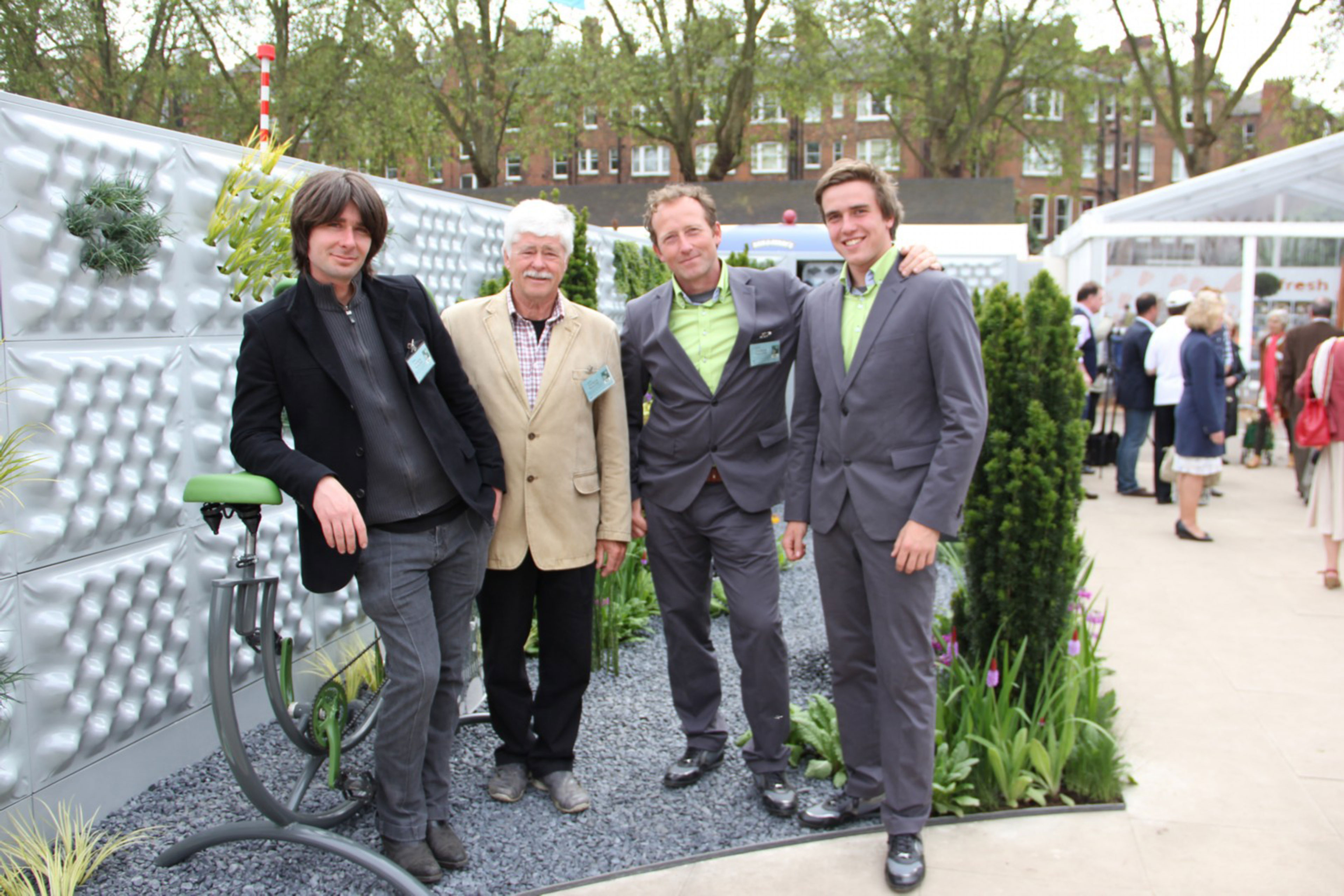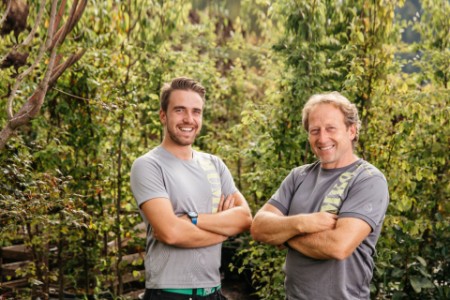From yogurt pots to luxurious greenhouses
Even though Tomaž lived in an apartment in his early childhood, he had the opportunity to learn about farm work. His father wanted him to gain work experience as early as possible, so he used to send him to his aunt’s farm where he would help out with various chores. At the age of 11, Tomaž and the family faced difficult times with the death of his father, which left a lasting mark on all of them. Overnight, Tomaž had to step into his father’s shoes and take on more responsibilities. “At the time,we were moving into a house and I took on my fair share of work, even though I was very young,” remembers Tomaž. He wanted to become a professional industrial designer, but at that time there was no demand for this profession. “So, I decided to become a farmer and fruit grower and enrolled in a secondary school at the Biotechnical Centre in Kranj. In the first year, I became enthusiastic about mushrooms and a whole new world opened up to me during my internship,” remembers Tomaž. In 1984, he worked without pay during the summer holidays just for the opportunity to gain experience. He then enrolled in the gardening school in Celje and became interested in Californian earthworms, which were very popular at the time.

Tomaž became familiar with composting during his internship at Hmezad in Radlje ob Dravi, while working on the production of mushroom-growing compost. As a birthday treat, he borrowed 2,000 German marks from his friend’s father (about €1000 in today’s money) and bought earthworms to process vermicompost or “worm humus”. He kept them at home, in the basement and in the garage, before moving them to the garden. “We used that humus to fertilize the flowers on the balcony and also a cactus, which soon had 264 flowers. The news about the prolific flowering cactus reached the media and people started calling to buy our humus and earthworms. Sales started rising and the money came rolling in,” reminisces Tomaž of these times during senior school. From the very beginning, in 1985, the farm was called Humko, the earthworm farm. Tomaž himself designed the logo for it, which is used to this day.
After finishing his schooling, Tomaž worked as the head of the gardening centre at Villa Bled, while his business with the earthworms continued to flourish. In 1991, he felt that the time had come for him to devote his time and efforts exclusively to his own company and left the job at Villa Bled.“At the very beginning, we sold humus made by earthworms and offered gardening services. Then we began to import peat under concession.In the season of 1992/93, Ljubljanska banka became our first major customer, where we were put in charge of flower arrangements around their offices. Our next project involved construction of greenhouses. The first one, which still stands today, was sold to Semenarna Ljubljana. I was the first in Slovenia to import substrates, fertilizers, bark and accessories for professional gardeners and sold them all over the country. We moved from using yogurt pots, loamy soil and compost to good pots, fertilizers and substrates – this was a breakthrough for us,” says Tomaž, briefly outlining the history of his company. Soon, they built three garden centres and their own production plant covering an area of 20,000m². They set up luxurious, state-of-the-art Dutch greenhouses, equipped with computers and chambers. They attracted numerous large customers such as Kurbus Radgona, the Maribor and Ljubljana agricultural faculties and the gardening school in Celje.
Tomaž explains that the wall functions as a forest. “It cleans the air and water, is pleasant to look at, absorbs noise and has a favorable and beneficial psychological effect. The advantage of the green wall is also reduced energy consumption. In the summer, plants protect the facility from the sun, and in winter, the plants and the substrate act as additional insulation against cold.”
Where there’s a will, there’s a way
As a result of the company’s rapid growth, they were faced with certain difficult challenges. One of these was inefficient work organization, which slowed the development process. In the season of 1998/99, when a decree on compulsory composting of organic waste was adopted, they
saw an opportunity. “I was the first one in and invested 1.2 million German marks in machinery, excavators, trucks and plant. We undertook a number of significant business opportunities with major companies such as Luka Koper, a sugar factory and three paper plants. More than 10,000m³ of compost was produced. We were deliberating buying another composting machine to cope with additional work. However, only six months later, the Slovenia. This left us with a debt of one million German marks,” explains Tomaž.
The bank offered two solutions - bankruptcy or compulsory settlement. Nevertheless, with hard work and strong will, they managed to repay all their debts within six years and the company began to develop and grow again. Today, their annual turnover is over €2 million.
One success follows another. Amongst many prizes they have been awarded over the years, they are particularly proud of a gold medal and prize for the most creative garden, awarded at the 2012 Chelsea Flower Show. They also carried out the entire external and internal horticultural arrangement of the Slovenian pavilion at Expo 2015. They are taking part in the international project Erasmus+ Vertical Plant Life and in a multi-annual feasibility study on the use of green walls in Nüremberg. They also present their products at international trade shows such as IPM in Essen and Galabau in Nürnberg.
The Humko products are also available in Croatia, where the company has worked on over 20 top tourist and manufacturing facilities. Their green wall systems are exported to countries all over Europe and they are currently developing a new urban gardening concept. “For this reason, we are one of the few Slovenian companies that provides comprehensive solutions for the greening of cities,” concludes Tomaž.
A smart green wall
Humko’s main focus has always been working with soil and innovations related to soil development. They produce all types of soil mixtures and substrates, from clay mineral mixtures and composts to professional peat and ecological substrates. In addition, they have their own production of compost, humus made by earthworms, wood fibers and their own mineral processing, covering zeolite micronization and bio-charcoal production. However, one of their most recognizable products is the green wall, which was patented in 2000. This unique multi-purpose wall made of a durable plastic panel or polyester with a high-quality color layer, can be planted with decorative flowers or used for growing herbs and vegetables. As artificial intelligence is integrated in the green wall, it is self-maintaining. “In addition to regulating the addition of fertilizers, the software recognizes where in the world the wall is located and the time zone, for which we have collected data from 200,000 cities around the world. In bad weather, the software automatically prepares shock therapy for the green wall, reduces watering, adds potassium and humic acid, and informs the owner that the wall is going into shock and needs protection from cold and frost. If you fail to take action, the wall lid closes automatically; if the wall does not have a lid, the fertilizer program is adjusted in advance,” explains Tomaž, of the innovative process. Cameras are the essence of the entire system as they recognize the activity of plants and detect the absence of photosynthesis. The entire process from beginning to end is carried out by Humko: from knowledge of plants and installation, to electricity and automation. A total of 27 subcontractors and suppliers are involved in the production of their entire green wall program.
Father and son make the best team
Tomaž’s son Jan has been involved in the family business from a very early age; however he has taken a more active role in the company in recent years. Over time, he has helped with different jobs where he was needed most, from fieldwork to production. “I finished senior school for computer sciences and then continued my studies in entrepreneurship. In the long run, I see myself taking over a leadership position within the company. When the time comes and I take over the family business, I hope to manage it as well as my dad has done or even better. I have a long way to go before that happens and I still have a lot to learn,” explains Jan of his future ambitions. He did not need to look far to find a role model; he found him in his father.“I had my hobbies and tried my hand at various things, until I decided to become more seriously involved in the family business. My dad has extensive knowledge in all areas and I admire his determination and passion. Personally, I lack general and technical knowledge of our branch, but I hope that one day I will be just like him. I am good at organizing things, planning work in production and in the field, plus I am more organized and have good people skills,” proudly explains 22-year-old Jan.
Despite being aware that learning from mistakes is important, Tomaž felt it was important to share his positive and negative experiences with his son. “I started working at the age of 12 by selling my products. As I did not have any business experience at that age, this was often taken advantage of. I lost quite a bit of money because I was naïve and untrained in terms of how to manage and deal with people. If you’re a family business, you need somebody to help you. I compensated for my lack of knowledge and experience by working 24/7, and now that my son is also involved in the business, things are much easier,” adds Tomaž. The youngest son Vid, who is currently studying at the Faculty of Mechanical Engineering, may also join the company in the future.
Summary
Humko in five words:entrepreneurship, perseverance, innovation, diligence, boldness.


